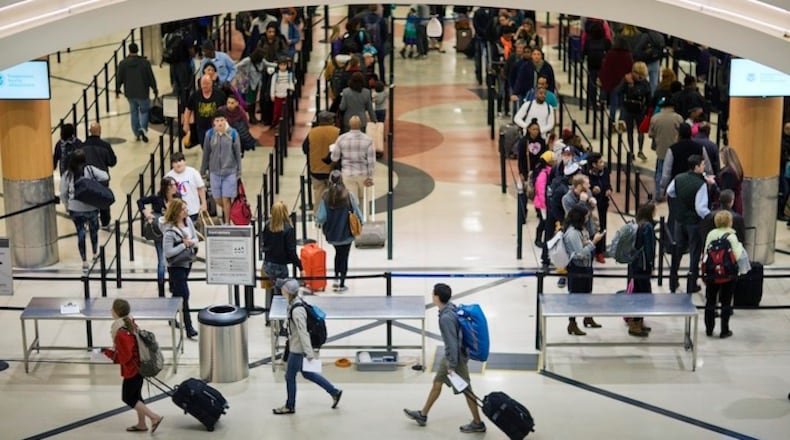WASHINGTON -- There is broad agreement that U.S. airports will not be a pleasant place this summer as security screening lines swell and officials warn that delays will trigger missed flights and may even harm the economy.
Where there is disagreement is how we got here.
Lawmakers say the Transportation Security Administration is to blame for poor use of resources and failing to anticipate growing traffic levels. The agency says it is doing the best it can within budgetary limits imposed by Congress and the "current threat environment."
"This stare-down match or game of chicken that they are engaging in now is maybe adorable to some, but the chickens will come home to roost once summer travel season begins," Jonathan Grella, executive vice president for public affairs at the U.S. Travel Association, said in an interview. "We're incredibly concerned about this communications gap."
Growing numbers of airline passengers, a decrease in TSA employees and an agency reeling from criticism last year that its security wasn't adequate has created dysfunction at the nation's airports.
Staffing authorized by Congress for the TSA, which operates security at airports across the country, has fallen from 47,147 full-time employees in 2013 to 42,525 this year, a decrease of almost 10 percent, according to agency data. At the same time, the volume of passengers rose from 643 million to an estimated 740 million this year, or 15 percent, according to TSA.
The result: In one week during peak spring travel in March, almost 6,800 people traveling on American Airlines missed flights due to delays at TSA checkpoints, airline spokesman Casey Norton said in an interview.
"We consistently have lines longer than an hour in some airports," Casey said. "Some airports have had lines longer than three hours."
While wait times at Atlanta's Hartsfield-Jackson International Airport weren't bad midday last week, frequent business traveler Jeff Truhlar said he endured a three-hour wait on the day before Thanksgiving last year at his home airport, Jacksonville International in Florida.
That experience prompted him to apply that day for a program known as PreCheck allowing streamlined screening for people who agree to a background check. "The line was so long I filled out the whole application," Truhlar said. The improvement since joining PreCheck has been like "night and day," he said.
Hartsfield-Jackson, the world's busiest airport, threatened earlier this year to seek to privatize its security force. TSA Administrator Peter Neffenger then added additional screeners, bomb-sniffing dogs and new technology, Reese McCranie, an airport spokesman said.
TSA, under pressure for years to reduce staffing and budgets, did so by pushing more travelers into PreCheck lines. When enrollment in the program failed to reach anticipated levels, the agency began sending regular passengers through the expedited screening lines.
That program, known as Managed Inclusion, was halted last year after it was criticized by lawmakers.
At the same time, a report last year by the Inspector General for Homeland Security found that testers had succeeded in slipping banned items through security 95 percent of the time was leaked to reporters.
Neffenger, who took office after the report, said in an interview April 8 that tightening screening has been one of his top priorities. "Anecdotal evidence is we have dramatically improved," he said.
With more rigorous screening and longer waits, the TSA is trying to encourage more people to enroll in PreCheck, Neffenger said.
"TSA is addressing the growing volume of travelers, with measures including more canine use, overtime, and accelerated hiring," the agency said in an emailed statement Wednesday.
About 2 million people are approved for PreCheck, according to Neffenger. Another 5 million are in other similar programs, such as U.S. Customs and Border Protection's Global Entry, according to TSA.
Encouraging more people to enroll in PreCheck is critical to reducing screening wait times while ensuring adequate security, according to travel advocates.
TSA should open more enrollment facilities at airports, Joseph Sitt, chairman the Global Gateway Alliance, which advocates on behalf of New York-area travelers, said in an emailed statement. Applicants must appear in person when they apply for PreCheck and busy airports like Newark Liberty International don't have them, according to the group.
A Senate subcommittee has agreed to allow the Homeland Security Department to shift $34 million to TSA. It would allow the agency to hire 768 transportation security officers, as the agency calls its screeners, and to pay additional overtime to existing employees, according to a press release by Sen. John Hoeven, a North Dakota Republican who is chairman of the panel.
While saying the House will "carefully consider" the request, Rep. John Carter, the Texas Republican who is chairman of the Appropriations Committee's homeland security panel, accused TSA of failing to act as the problem worsened.
"Common sense and historical trends tell us air travel will increase during the summer months and when the economy improves, and TSA has simply failed to plan responsibly," Carter said.
"Year after year, Congress has met the budget requests of TSA," he said. Lawmakers increased funds for TSA this year above what President Barack Obama requested, he said.
For now, airports and airlines are girding for a tense travel season that officially kicks off on Memorial Day.
"People are going to be irate when the summer comes and these lines materialize," Grella said.
Given the time it takes to hire and train TSA screeners, some disruptions this summer may be inevitable, said Kevin Burke, president of the Airports Council International-North America trade group.
"There's not enough time between now and this holiday season to be able to fix it," Burke said. "The real question is how do we avoid this again."
About the Author
Keep Reading
The Latest
Featured


